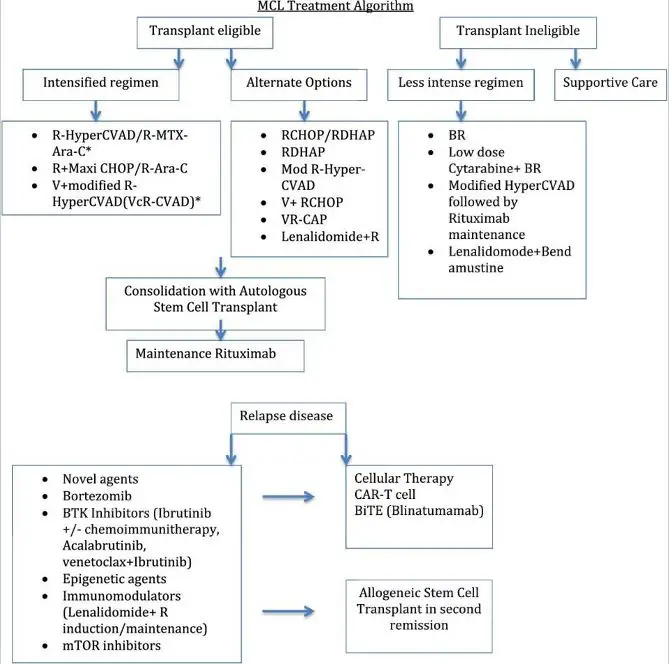
Annals of Pharmacotherapy, Ahead of Print.
Objectives: To discuss (1) recent and emerging data for pharmacological management of untreated and relapsed/refractory (R/R) mantle cell lymphoma (MCL) with agents approved in the United States, (2) important considerations for toxicity monitoring and management, and (3) preliminary data and ongoing studies for agents in MCL-specific clinical trials. Data Sources: PubMed/MEDLINE, EMBASE, Google Scholar, product labeling, National Comprehensive Cancer Network, American Cancer Society, and ClinicalTrials.gov were searched for studies published between January 1, 2017, and January 31, 2020, and key historical trials. Study Selection and Data Extraction: Relevant studies conducted in humans and selected supporting preclinical data were reviewed. Data Synthesis: MCL is a rare but usually aggressive non-Hodgkin lymphoma that most commonly affects the older population. Traditionally, the treatment of MCL has been determined based on transplant eligibility. Newer data suggest that more tolerable frontline therapy may produce outcomes similar to intensive historical induction regimens, possibly precluding fewer patients from autologous stem cell transplant and producing better long-term outcomes in transplant-ineligible patients. In the R/R setting, novel regimens are improving outcomes and changing the landscape of treatment. Relevance to Patient Care and Clinical Practice: This review summarizes and discusses recent and emerging data for management of newly diagnosed and R/R MCL; key supportive care considerations for agents are also discussed. Conclusions: Recent study results are changing management of MCL. Although these data have complicated the picture of regimen selection, increasingly effective and tolerable therapy and additional anticipated data point to a brighter future for patients with MCL.
Objectives: To discuss (1) recent and emerging data for pharmacological management of untreated and relapsed/refractory (R/R) mantle cell lymphoma (MCL) with agents approved in the United States, (2) important considerations for toxicity monitoring and management, and (3) preliminary data and ongoing studies for agents in MCL-specific clinical trials. Data Sources: PubMed/MEDLINE, EMBASE, Google Scholar, product labeling, National Comprehensive Cancer Network, American Cancer Society, and ClinicalTrials.gov were searched for studies published between January 1, 2017, and January 31, 2020, and key historical trials. Study Selection and Data Extraction: Relevant studies conducted in humans and selected supporting preclinical data were reviewed. Data Synthesis: MCL is a rare but usually aggressive non-Hodgkin lymphoma that most commonly affects the older population. Traditionally, the treatment of MCL has been determined based on transplant eligibility. Newer data suggest that more tolerable frontline therapy may produce outcomes similar to intensive historical induction regimens, possibly precluding fewer patients from autologous stem cell transplant and producing better long-term outcomes in transplant-ineligible patients. In the R/R setting, novel regimens are improving outcomes and changing the landscape of treatment. Relevance to Patient Care and Clinical Practice: This review summarizes and discusses recent and emerging data for management of newly diagnosed and R/R MCL; key supportive care considerations for agents are also discussed. Conclusions: Recent study results are changing management of MCL. Although these data have complicated the picture of regimen selection, increasingly effective and tolerable therapy and additional anticipated data point to a brighter future for patients with MCL.